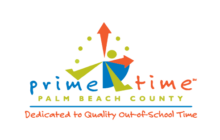9:00 am - 12:00 pm
Over the last 5 years, Prime Time has helped the JASE program become a successful afterschool program in Martin County. We are thankful for the variety of trainings offered, yearly actions plans and multiple site visits.
Afterschool ProfessionalMartin County Parks and Recreation
VIRTUAL: Reframing Behavior Management Series
Participants are REQUIRED TO ATTEND ALL TRAININGS in the series and complete assignments in between trainings.
By registering for this training, you are committing to all training session dates.
Reframing Behavior Management - Part 1 03/16/2023
Reframing Behavior Management – Part 2 03/30/2023
Upon successful completion of this training series and follow up assignment(s), the participant will earn 8 clock hours (.8 CEUs) of training.
Do you struggle with managing challenging behaviors of the youth in your program? Would you like to learn a way to facilitate youths’ self-management skills when they misbehave? In this Behavior Management series participants will learn how to reframe all youth behavior as opportunities for youth to learn responsibility, emotion management and problem-solving skills.
In the Part 2 training session, participants will dive deeper into how youth have “Mistaken Beliefs” when they are acting out. You will have an opportunity to practice activities and strategies that help youth improve their communication, responsibility, problem-solving and empathy skills. You will leave this training with a “toolkit” of easy-to-use activities and strategies to improve youth behavior.
Reframing Behavior Management - Part 1
Training Objectives:
Participants will:
- Identify how youths’ challenging behaviors relate to skills they need to learn.
- Describe youths’ needs for belonging and significance.
- Determine the “mistaken belief” underneath youths’ negative behavior.
Reframing Behavior Management - Part 2
Training Objectives:
Participants will:
- Compare natural/logical consequences to punishment.
- Apply the authoritative/encouraging style of discipline through role-play.
- Employ strategies for responding to behavior that will increase youth responsibility and teach important life skills.
Core Competencies Addressed:
Core Knowledge Area –Child/Youth Growth and Development: Entry Level, Level 1, Level II.
1.C: Use developmental knowledge to create healthy, respectful, supportive, and challenging environments
C1- Respond and interact positively with all children and reinforce appropriate behaviors
Core Knowledge Area – Interaction with Children/Youth: Entry Level and Level 1.
5.A: Promote meaningful engagement, leadership, and guidance of the children/youth
A3- Identify feelings and appropriate ways to express feelings
A4- Provide a supportive environment in which children and youth can provide input on, learn, and practice appropriate and acceptable behaviors
Primary QIS Scales Addressed:
III-N- Cultivating Empathy-Staff Support Young People in Practicing Empathy Skills.
2 Staff ask young people to discuss the causes or consequences of other people’s emotions (e.g., in response to in-the-moment situations, past experiences, or in discussion of other actual or fictional events or experiences).
II-G- Emotion Coaching
3 More than once, staff ask young people about or discuss constructive handling of their emotions (e.g., staff support young people to distinguish between feelings and actions, talk about ways to calm oneself or to express pride in an accomplishment without putting others down, etc.).
II-I- Fostering Growth Mindset
1 Staff guide or support young people in attempting to figure out for themselves how to improve (e.g., “So, what could you do differently?” “Next time, what could you do to keep yourself focused?”).

